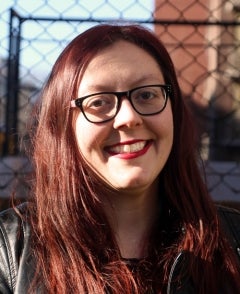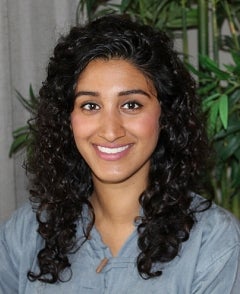
Storytellers competition highlights human dimensions of research
Two Waterloo graduate students among 25 winners of Social Sciences and Humanities Research Council prize

Two Waterloo graduate students among 25 winners of Social Sciences and Humanities Research Council prize
By Staff Marketing and Strategic CommunicationsResearch projects that aim to develop deeper understanding of human interactions has earned national recognition for two University of Waterloo graduate students.
Fatima (Noori) Khan, a Master’s student in the School of Environment, Resources and Sustainability, and Emma Vossen, a PhD candidate in English, were among 25 finalists in The Storytellers competition. Funded by Canada’s Social Sciences and Humanities Research Council (SSHRC), Storytellers challenges graduate students to tell a story about the impact of their SSHRC-funded research in 300 words or three minutes.
 Vossen’s PhD dissertation in English examines how accessible games and gamer culture is to girls and women. Her Storytellers submission was about her vision for the First Person Scholar website, run by graduate students at the Games Institute. The site enables games studies scholars to publish their research in a way that is free, open access and written in a way that can be understood by those without a graduate degree.
Vossen’s PhD dissertation in English examines how accessible games and gamer culture is to girls and women. Her Storytellers submission was about her vision for the First Person Scholar website, run by graduate students at the Games Institute. The site enables games studies scholars to publish their research in a way that is free, open access and written in a way that can be understood by those without a graduate degree.
“I entered the contest because I think there are a lot of very troublesome and problematic things in academia that we accept as an implicit part of our lives and culture,” Vossen says. “I wanted people to consider the implicit assumption that academic publishing ‘just works that way,’ and instead make them ask why it works that way.”
 Khan is pursuing an MES degree in the School of Environment, Resources and Sustainability at the University of Waterloo. Working with a collaborative research team, she is focusing on how environmental changes are understood by the people directly affected; particularly sharing the perspective of rural women. Her research site is located on the east coast of India where she is exploring how her interests are woven within changes in coastal communities.
Khan is pursuing an MES degree in the School of Environment, Resources and Sustainability at the University of Waterloo. Working with a collaborative research team, she is focusing on how environmental changes are understood by the people directly affected; particularly sharing the perspective of rural women. Her research site is located on the east coast of India where she is exploring how her interests are woven within changes in coastal communities.
“I noticed a gap in the research that had already been conducted in Chilika lagoon,” Khan says. “A focused perspective of women was not shared, and being a woman myself, this was something I knew I could connect with and wanted to pursue in my research.”
The competition is an opportunity for early career researchers to share social sciences and humanities work on a national stage.
“I think the SSHRC competition aims to bring out the creative genius in each of the participating students by allowing them the opportunity to speak about their research using a language and method they most prefer, says Prateep Kumar Nayak, an assistant professor in the School of Environment, Enterprise and Development at Waterloo who co-supervises Khan with Derek Armitage. “The competition exemplifies novel ways in which to comprehend and communicate some of the most pressing issues in the world today.”
In the first phase of the competition, students submit a summary of their research in a video, podcast, text or infographic. The top 25 finalists — including Vossen and Khan, will receive $3,000, and a registration and accommodations for Congress, SSHRC’s annual conference, where they will give a three-minute live presentation of their research story. Five winners will be selected to present their work at the SSHRC Impact Awards in the fall.
This is not the first year that a University of Waterloo student has impressed the judges. In 2013, Steve Wilcox, PhD candidate at the Games Institute, made the top five for his presentation on a new method for tracking and understanding the complex and exploding field of game studies.

Read more
Meet the 14 exceptional students representing Waterloo’s newest grads

Read more
Environment and Arts student, Eloise Fan, reflects on how studying her twin passions led not only to a BES, but also to academic distinction

Read more
The medal honours outstanding individuals across Canada who have made significant contributions to their communities
The University of Waterloo acknowledges that much of our work takes place on the traditional territory of the Neutral, Anishinaabeg, and Haudenosaunee peoples. Our main campus is situated on the Haldimand Tract, the land granted to the Six Nations that includes six miles on each side of the Grand River. Our active work toward reconciliation takes place across our campuses through research, learning, teaching, and community building, and is co-ordinated within the Office of Indigenous Relations.